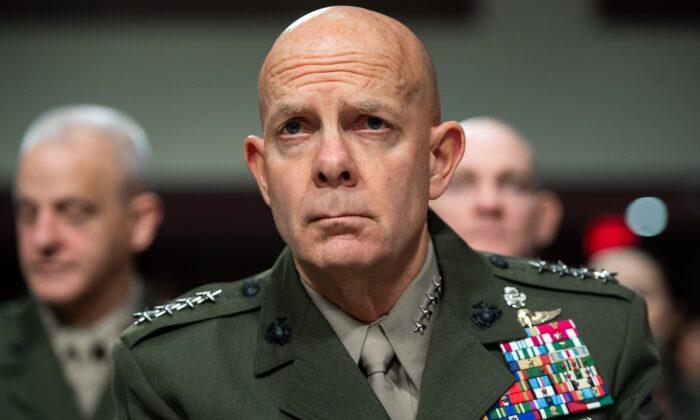WASHINGTON—U.S. Marine Corps Gen. David Berger said on March 14 that the Russian downing of a U.S. drone reflects his “biggest worry.”
“This is my biggest worry, both there and in the Pacific, is that an aggressive Russia or China pilot or vessel captain or something gets too close, doesn’t realize where they are, causes a collision, and it’s 2 in the morning and we’re trying to unpack this as fast as we can. I really worry about that,” he said at an event at the National Press Club. “In other words, either intentionally or unintentionally, things bumping into each other, causing a collision and then two great nations—powerful nations—trying to sort it out at 2 in the morning.”
U.S. European Command announced on March 14 that two Russian Su-27 aircraft intercepted an unmanned MQ-9 aircraft, which collects intelligence, over the Black Sea. In response, the United States shot down the drone into the sea.
“Our MQ-9 aircraft was conducting routine operations in international airspace when it was intercepted and hit by a Russian aircraft, resulting in a crash and complete loss of the MQ-9,” said U.S. Air Force Gen. James Hecker, the commander of U.S. Air Forces Europe and Air Forces Africa, in a statement. “In fact, this unsafe and unprofessional act by the Russians nearly caused both aircraft to crash.”
Berger said that what happened exemplifies the United States not being able to get answers from adversarial counterparts in light of such incidents.
“Even more challenging, because right now on our side—on, let’s say, the PRC [People’s Rebublic of China]—normally we would have communications with the PLAN [People’s Liberation Army Navy], their military,” he said. “It doesn’t exist right now. They won’t communicate with us.”
Berger said the normal channels through which the two countries might diffuse a situation have been suspended.
“I worry that something will happen at 2 in the morning and we can’t talk to our counterpart to say, ‘What the heck was that about?’ I worry, I do.”
Following the event, Berger told The Epoch Times that the incident doesn’t merit activating Article 5 of the NATO charter, which says that an attack on one member nation is an attack on all members. He said this is because the act was “over water, which isn’t NATO territory,” and that it happened in “international airspace over international water.”
He said he wasn’t aware of any other threats from Russia in light of the incident.





